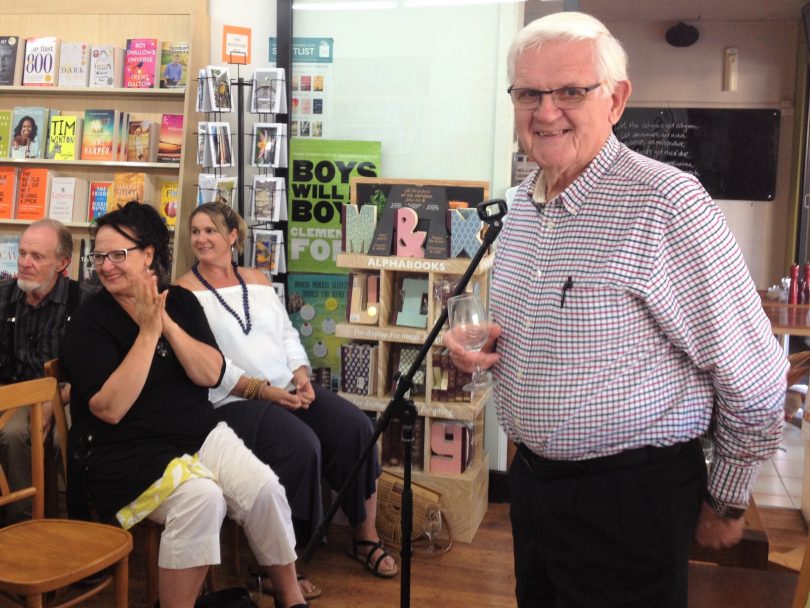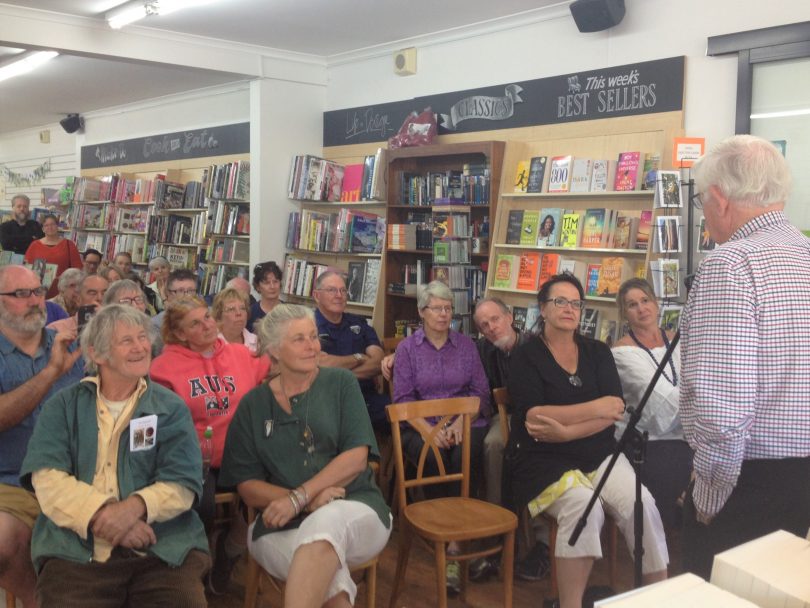
Alex Nicol at Candelo Books in Bega on March 7 at the launch of his book “Old Days, Old Ways”. Picture: Elka Wood.
It’s hard to believe in the internet age but there is no known recording of journalist, playwright and now author Alex Nicol’s All Ways on Sunday radio show for ABC, which first broadcast in 1969.
“Not one single second was archived,” Alex says cheerfully “so you’ll have to make do with my blurry recollections.”
The show told stories spanning from the late nineteenth century to 1970 that Alex gathered in his travels around regional Australia and he is very happy to have gathered them when he did, “all those people who the stories belong to are gone now and I’m in my eighties.”
But the recollections on the pages of Alex’s book, Old Days, Old Ways, published by Allen and Unwin this month, read as clearly as if they’d been lived yesterday and are filled with characters who make Australian history come alive.

The crowd at the launch, held at Candelo books in Bega, included half a football team [not pictured]. Picture: Elka Wood
And the early immigrants who were rural Australia’s best bet for transport, men from Pakistan or the Middle East known as ‘Afghans’ who led camels loaded with wool across the desert and would beg for a ‘green’ [freshly killed] piece of sheepskin from farmers to perform basic skin grafts on their camels, whose flesh was rubbed away by heavy wooden saddles.
“And that’s why a bale of wool is the size that it is today,” Alex marvels “because two of them were a balanced load for a camel.”
Alex takes a particular interest to changes to the farming and transport industries, especially pre-Australian railways.
At his launch at Candelo Books last week, he tells a story about a man charged with foreclosing farms during a bad drought and fall in the market.
“The kids at these farms were dressed in hessian sacks and many had Ricketts [a disease of malnourishment] and the fathers were men who had fought on the western front – tough men. This man had to get them to sign and walk away from their land and he told me he had a trick. If the farmer wouldn’t sign, this man would bring a bag of oranges with him.”
Alex pauses to look around before he finishes the story.
“When the kids saw those oranges – he’d sign.”

Alex’s stories are filled with humour, as well as darkness. Picture: Elka Wood.
Acknowledging the significant positive changes in Australian culture over the period of history the book explores, Alex says that this is especially apparent for repressed groups and minorities such as Indigenous Australians, immigrants, and women.
But the biggest change? For Alex, it all comes down to one thing – population.
“I don’t think many people realise it, but Australia’s population has doubled since 1969,” he says “and I don’t really know how we’re going to support further growth. Australia is a bloody dry continent.”
According to Alex, he doesn’t feel old, “we’re a bit better looked after now,” he says, and he is grateful to Allen and Unwin for giving him the chance to write Old Days, Old Ways because “it keeps my mind active.”
He is currently at work on another book and will perform the play which got the attention of publishers, “Sunday People,” at the Tathra Hotel at an unspecified date in the near future.
Old Days, Old Ways is available at all good bookshops – including Candelo Books.







